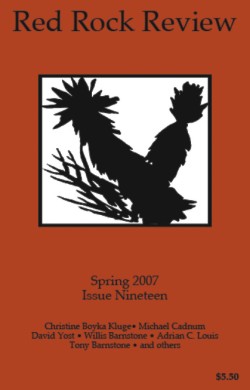|
Interview
A Home for Literature
In an interview with the Star, Richard Logsdon, editor of Red Rock Review talks about his work
Ahmede Hussain
What are the ideas behind your journal?
Many ideas have shaped Red Rock Review. First and foremost was the intention to

Richard Logsdon |
publish the very best poetry and fiction available. This stated intention, while a bit generic (What journal doesn't try to publish the best of the available literature?), helped us establish a very high standard for writers who wished their works to be considered for inclusion in Red Rock Review. (The stated intention, too, gave us the right to reject local writers who felt some sort of entitlement to get published by a Las Vegas journal.) Vague as the guideline sounds, we did succeed in attracting works by very good writers by as early as the second issue Ron Carlson and Alberto Rios come to mind and from then on the quality of our submissions skyrocketed. Beyond this, in setting a lofty standard for our magazine, we contributed to the on-going cultural redefinition of a community Las Vegas that is notorious for creating its own decadent art as a standard of perfection. But we had something else in mind another idea when we started our journal. Twelve years ago, when we published the first issue of Red Rock Review, Las Vegas was in the midst of a crisis of identity. The city couldn't decide who or what it is: fighting against the desire to become a more or less normal city was Las Vegas's notorious gangsterish past (Something some locals still try to deny). Red Rock Review took advantage of this cultural identity crisis, launching a journal whose works rivaled those in the very best journals in the country and that indicated to the public at large that Las Vegas had a serious interest in taking on an identity that would include a genuine love of the arts. By the way, I don't think that Las Vegas will ever resolve its identity crisis but that makes the city a fascinating place to live.
Along with the desire to help reshape the city's image was the desire to give our college Red Rock Review is published under the auspices of the College of Southern Nevada something of cultural worth.
While making an editorial decision, what do you look for in a write-up?
I'd like to say that we're open to all kinds of literature, but that may not necessarily be true. As far as fiction is concerned, we're generally drawn to well crafted stories that are built around a conflict that provides the moral centre to the piece. Accordingly, the plots of the stories that we accept for publication are generally character-driven. Two, we look for full development of character and situation. Of course, there are exceptions: occasionally we'll accept a story that takes liberties with the conventions of story telling and that may fall into the post-modern category. Still, I think as far as short fiction is concerned, the editorial staff of Red Rock Review is pretty traditional.
As for poetry, while we're certainly interested in well-crafted pieces, we're just as interested in different voices, in poems that provide a fresh perspective of something very familiar. To provide an example, I'm currently working on a review of local writer Jarret Keene's latest collection of poems, A Boy's Guide to Arson (Zeitgeist Press, 2008).
How important do you think it is for a writer to know her audience/reader?
It's almost impossible to answer this question, which I shall nonetheless try to take in a couple of directions. For one thing, the question suggests that the writer's knowledge of his/her audience has something to do with the content and success of the submitted work. We run into problems here. Heightened awareness of the audience's needs may lead to a hyper-consciousness that has its parallel in the narrator of Dostoevsky's Notes from Underground. You may recall that the narrator referred to hyper-consciousness as a disease. The narrator's propensity to think too much about others, about himself leads to a kind of inertia, a kind of paralysis, and I think the same may happen with the writer whose acute awareness of his /her audience stifles the creativity, leads the writer to compromise his/her vision, and results in a watered down version of what the writer originally intended. Keep in mind, however, that I am not suggesting that a knowledge of audience is not important for the writer.
Your question is so open that it leads me to other speculation. To get to my second point, it could be argued that the writer creates his audiencejust as the audience may help shape the writer. Several years back, I recall reading some essays by Umberto Eco, who made the rather intriguing point that the writer, while aware of the audience, creates with the very act of writing a unique voice that, in turn, actually shapes the audience. I like the point Eco made, because he touched upon the existence of an on-going dynamic between writer and audience, neither one of which was necessarily fixed in place.
Do you think every novelist writes history, both at a personal and a social level?
What you're asking, I think, is to what extent the novelist engages in the writing of history, both on a personal and social level. It's a difficult question and calls for a moving away from the traditional concept of history as a body of writing distinct from the world of fiction and an acceptance of the fact that the writer of fiction can somehow participate in the writing of history. Clearly, the Bengali writer Ahmed Faruk writes a very personal fiction that can be fully understood only within the context of socio-political realities. In his case, the personal and the socio-political become almost one and the same. The question, however, is not merely applicable to contemporaries who write within and about a volatile socio-political situation. I'm thinking of Tolstoy's War and Peace (You see what a traditionalist I am.), which is about several characters' participation in the Napoleonic Wars. In the case of this magnificent novel, the personal cannot really be separated from the social/political/historical dimension that constitutes actual reality of the novel. In fact, doesn't Tolstoy end with a lengthy section in which he argues, among other things, that in the case of his novel the fictional, both on a personal and social level, becomes one with the historical?
But then again, the question may be more applicable to those writers whose fiction compliments or illuminates the volatile social and historical realities of their particular countries. If this is so, then the question may have little to do with those Western writers who, composing from a safe place, do not think of their characters and novels as somehow reflective of larger social/political/historical realities. Of course, even as I write this, I can think of a glaring exception to my implied generality concerning Western writers.
Do you think the world has become a dangerous place in which to live?
One would think that globalisation would have succeeded in making the world a lot less dangerous, a lot less hostile, that inventions like the Internet and cell phones would have dissolved the barriers of hostility separating people. How very naïve. While barriers do come down, new problems emerge: Internet predators, identity theft, global terrorism, etc.
But let's not ignore the larger and more obvious question: when has the world not been a dangerous place to live? History shows the world embroiled in a never-ending series of conflicts. Sometimes the conflicts are civil, sometimes national with country pitted against country. Sometimes -- perhaps most often -- it's the good guys vs. the bad guys. Of course, I'm over-simplifying -- and I'm writing from a place (Las Vegas, Nevada) where the security that I enjoy is balanced against city crime that includes shootings -- in the high schools, on the streets, in the casinos -- are not a rare event. Even so, I recognise that far more dangerous places exist than Las Vegas. Pakistan, Iran, Iraq and Israel come to mind as examples of such places. Too, the ever-present threat of terrorism can make even an Idaho farmer a bit edgy.
But then, again, I don't think the question necessarily requires an answer that categorises countries/regions on the basis of danger. The question concerns the world and brings to my mind the famous poem “The Second Coming” by W.B. Yeats:
Turning and turning in the widening gyre
The falcon does not hear the falconer;
Things fall apart; the center cannot hold etc. etc.
We all inhabit the same planet, and all will be somehow touched by those smaller and larger apocalyptic events that occur throughout history. Not that we're heading towards some kind of Armageddon. I'm not suggesting that we're creeping towards the end times even though I do admit that the U.S. has so embroiled itself in the politics and warfare of the Middle East that it's sometimes difficult not to imagine that we're headed toward something of cataclysmic proportions. (Of course, the same thinking, that we're all headed toward an international showdown, characterised the Cold War; when I was growing up, the question was not if but when the United States was going to war against the Soviet Union?)
Copyright (R) thedailystar.net 2008 |
